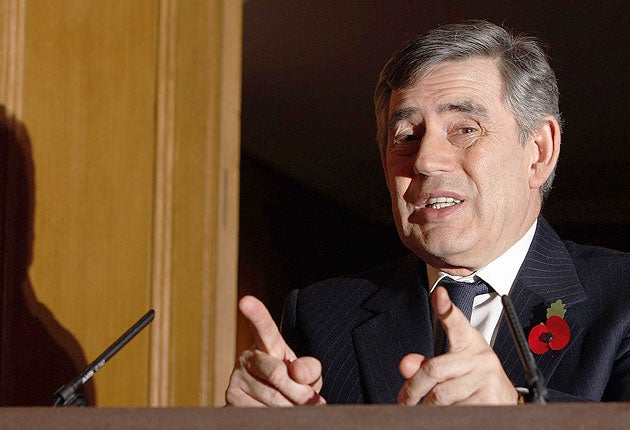Gordon Brown hit out at huge interest rate hikes by credit card firms today, warning that they must behave "responsibly".
The Prime Minister insisted it was unacceptable to saddle British customers with big increases as the recessions bites.
The Government would act to establish "clear principles" to make sure companies treated people fairly, he added.
Downing Street said Mr Brown had been alarmed by recent examples where credit rates had gone up by 10% overnight, and a store card which was charging 200%.
The intervention came after a study of 240 credit cards showed that, while the Bank of England had dramatically reduced its official bank rate from 5% in May to 3% this month, the cost of borrowing on cards had gone up.
The research by banking experts Defaqto for The Independent showed that since May, the average annual percentage rate (APR) on cards rose by 0.4%, climbing from 17.2 to 17.6%.
Speaking at his regular Downing Street press conference, Mr Brown said: "I think we have got to bring the credit card industry in to talk to them to join with us in establishing clear principles to apply to the costs people face on their existing debts.
"This new responsible approach to lending that I think that the credit card industry wants to support will help households through the difficult period that they have.
"I think by setting new rules and establishing clear practices, I think the public will be in a better position to look at the credit card industry as a whole."
The PM's spokesman said that Mr Brown had been "very concerned" by the actions of some credit card companies, which was "hard to justify". The industry has been summoned to the Department for Business, Enterprise and Regulatory Reform to discuss the issues, he added.
"There are some examples of some good practice out there," the spokesman said. "But we do want to work with the industry to ask them to bring forward a statement of best practice about how they will apply fair principles to existing debt and continue to make credit available in a responsible way and support families in difficulty."
Mr Brown again dropped heavy hints this morning that the Government is set to cut taxes in a bid to kick-start the economy.
He also insisted that any reductions and investment packages should be co-ordinated globally to have the maximum impact, and called for a deal on liberalising world trade to be struck "within days".
Ahead of a crunch gathering of world leaders in Washington this weekend, the premier told journalists: "The most important thing I'm saying today is if we have a fiscal stimulus in Britain and it is not repeated in other countries then it will have far less effect and far less benefit than if it were done in every other major economy around the world."
He went on: "One initiative here and there is not going to make the difference.
"What you need is a co-ordinated strategy and preferably a co-ordinated strategy across the world and not just in one country."
Mr Brown explicitly admitted that any measures the Government brings forward will be "unfunded" and require significant extra borrowing.
"You have to take action that is initially unfunded," he said. "That is the idea of a fiscal stimulus."
He then went on to attack the Conservatives for claiming their £2.5bn tax break scheme unveiled today was self-funding when in fact it was not.
The PM said the Tory approach was "confused", and questioned whether excusing firms £2,500 in national insurance contributions when they took on medium-term unemployed would actually create jobs.
But shadow chancellor George Osborne responded that Mr Brown was the one confused about unfunded tax cuts.
"For years he attacked them as reckless and irresponsible. Now he says they are necessary," Mr Osborne said.
Setting out his vision for co-ordinated action to combat the global slowdown, Mr Brown said the G20 summit must avoid a repeat of the failure of the 1933 world economic conference in London, which ushered in an era of protectionism.
Only "small differences" were now preventing a deal on liberalising world trade being concluded, he insisted. The Doha round of negotiations have been stalled since the summer, following rows between developed and developing nations over agricultural import rules.
"If over the coming days countries can resolve what I now regard as small differences it would send a huge signal to the whole world that the answer to 2008's crisis is not the beggar thy neighbour protectionate of past crises, but stimulating a world trade agreement," Mr Brown said.
The body that represents credit card firms, APACS, welcomed the opportunity to hold talks with the Government.
"The industry continues to be committed to the principles of responsible lending, and to ensuring that any customer who finds themselves in financial difficulty is treated sympathetically and fairly. This commitment is clearly stated in The Banking Code," a spokesman said.
"Based on our own data on credit card expenditure up to the end September 2008, there is no evidence to show that a large number of customers are using their cards any differently now than previously."

Join our commenting forum
Join thought-provoking conversations, follow other Independent readers and see their replies
Comments